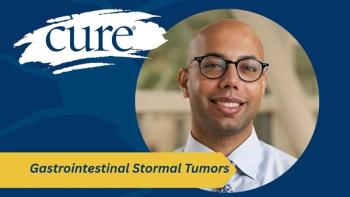
The U.S. commercial launch of LYMPHIR offers a new treatment option for patients with relapsed/refractory stage 1 to 3 cutaneous T-cell lymphoma.

The U.S. commercial launch of LYMPHIR offers a new treatment option for patients with relapsed/refractory stage 1 to 3 cutaneous T-cell lymphoma.

Dr. Girindra Raval sat down for an interview with CURE to discuss what patients with EGFR-mutated lung cancer should know about their treatment options.

I share how my sister’s final days felt different from her many rebounds and how I continue to process the grief of losing her after years of anticipation.

Nona Baker, who was first diagnosed with a blood cancer in 1991, shares her experience with polycythemia vera.

In November 2025, the FDA issued multiple oncology approvals that expanded treatment access for patients with breast, lung, blood and solid tumor cancers.

The FDA granted traditional approval to Jaypirca for relapsed or refractory chronic lymphocytic leukemia or small lymphocytic lymphoma.

Dr. Charles M. Rudin discussed recent treatment advancements for patients with small cell lung cancer.

IGV-001 improved survival for newly diagnosed glioblastoma in a phase 2b trial, with patients living a median 20.3 months and no serious safety issues.

I found purpose again after my myeloma diagnosis when I returned to teaching and shared my work, moments that reminded me I could still grow and reconnect.

I explain how the words caregiver and incurable shaped my wife’s cancer journey and why I believe more hopeful language better reflects our experience.

Cindy and Katie share how finding a friend who understood the caregiving journey made the experience less isolating and helped them navigate loss and hope.

Although most patients with localized kidney cancer have high cancer-specific survival, surveys show a gap between doctor and patient perceptions of cure.

CURE recently sat down with an expert to discuss crucial information for patients with gastrointestinal stromal tumors, or GISTs.

A stamp on my Christmas cards stirred deep memories and reminded me that small actions can make a meaningful impact in the fight against breast cancer.

Among young patients, clinical trial results have shown that Pedmark is associated with a reduction in chemotherapy-induced ear damage.

An expert explained what patients newly diagnosed with gastrointestinal stromal tumors need to know.

Feeling like others have it worse can dismiss the real challenges of follicular lymphoma and leave patients without the support they need.

Cell therapies, which have made waves in the treatment of blood cancer, are showing potential for solid tumors.

Only 5% to 10% of breast cancers are caused by inherited gene mutations like BRCA1 or BRCA2. I do not carry one. But my family history was enough.

I love flowers, and I especially love the Japanese tradition of ikebana. In Japanese culture, ikebana is the art of flower arrangement.

Optimism, treatment momentum and communication gaps drive late systemic therapy, increasing hospitalization and intensive care use for patients with cancer.

The FDA approved Armlupeg as a biosimilar to Neulasta to reduce infection risk in people receiving chemotherapy and those exposed to radiation.


Meta: Stage 1 essential thrombocythemia is a chronic blood disorder with high platelets, manageable through monitoring, medication, lifestyle and care.

Newly diagnosed with stage 3 papillary thyroid cancer? Get the facts on treatment options and side effects to guide the conversation with your physician.

Breaking down what patients need to know about penile cancer, from diagnosis to treatment.

This guide explains diagnosis, staging, molecular testing and treatment options for non-small cell lung cancer to help patients prepare informed questions.

CURE sat down with Dr. Daniel J. Boffa to discuss the current treatment landscape of lung cancer care in recognition of Lung Cancer Awareness Month.

Dr. Daniel J. Boffa discusses advancements in lung cancer care, including the role of minimally invasive surgical techniques and new systemic therapies.

CURE discussed the regional anesthesia technique known as PEC I and II blocks with breast surgeon Dr. Christopher M. McGreevy.